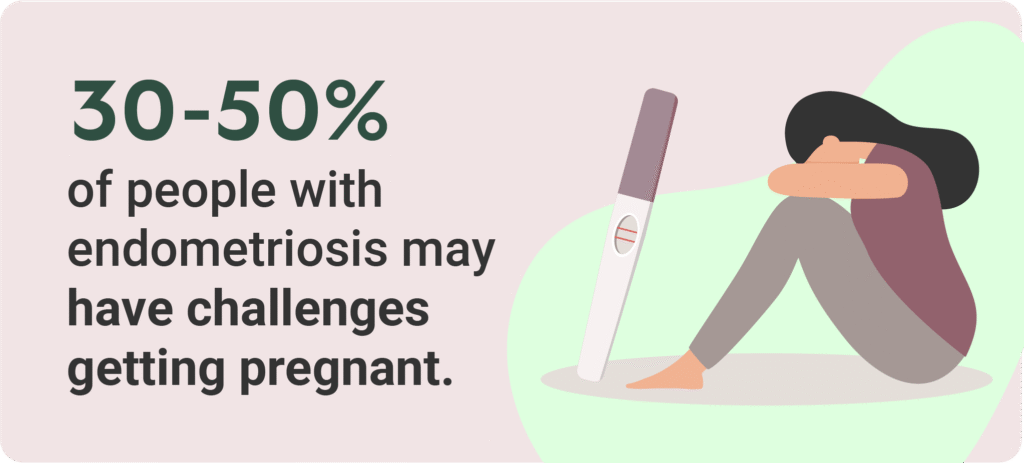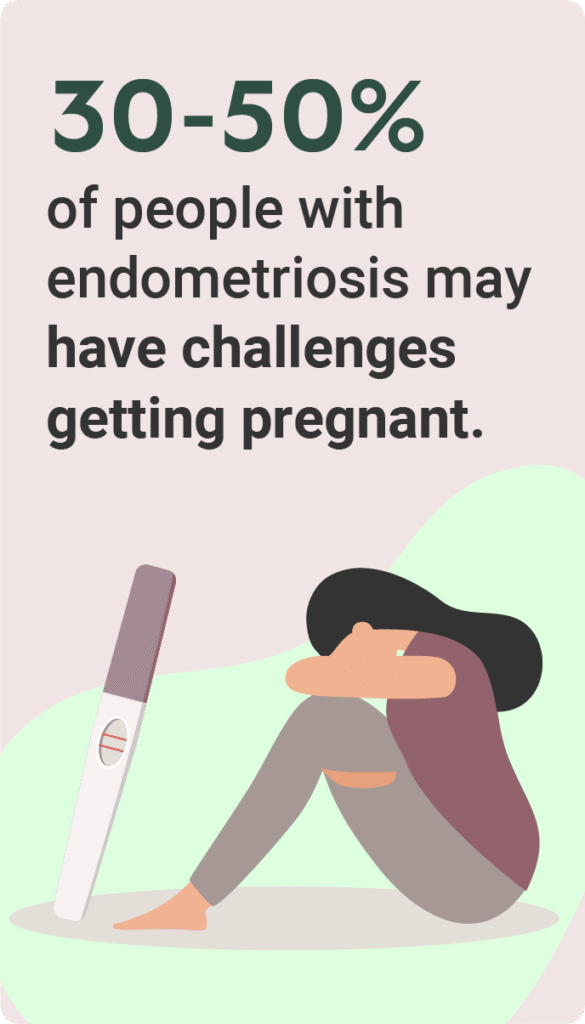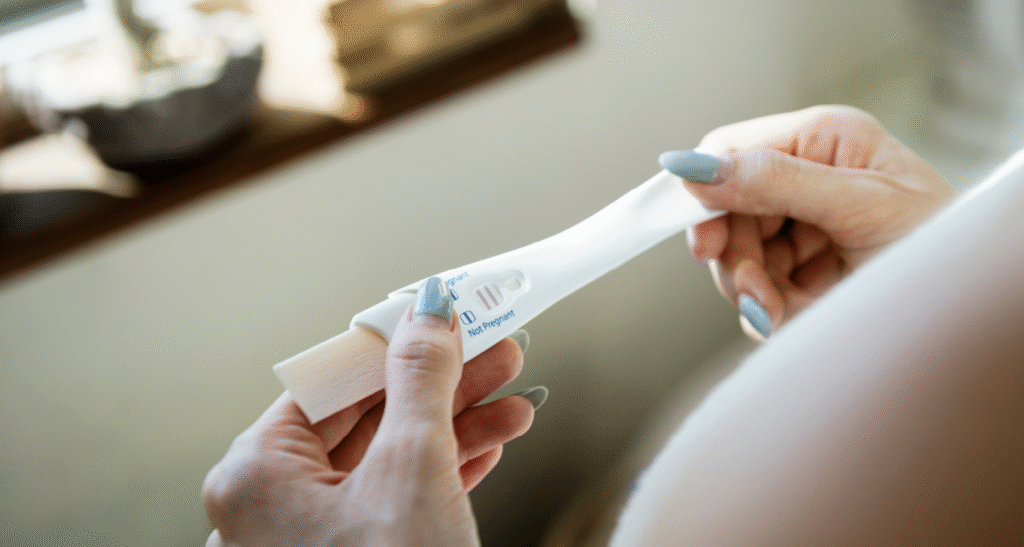Trying to conceive when you have endometriosis can feel overwhelming. And when the only advice you hear is “Just take birth control,” it can be disheartening, especially when you’re actively trying to grow your family.
At ESSE Care, we work with patients navigating the difficult intersection of endometriosis and fertility. Whether you’re wondering if you should have surgery before in-vitro fertilization (IVF) or trying to understand how hormone therapy fits into your journey, we’re here to help.
Why Does Endometriosis Affect Fertility?
Endometriosis is more than painful periods. For many women, getting an endometriosis diagnosis takes years. This delay can impact fertility, especially if the disease has progressed. Here’s how:
- Inflammation in the pelvis can impact egg quality and fertilization.
- Poor uterine receptivity may prevent embryo implantation.
- Tubal scarring or adhesions can block eggs from reaching the uterus.
- Endometriomas (chocolate cysts) may affect ovulation and reduce ovarian reserve.
This is why fertility treatments like IVF sometimes fall short for patients with untreated or undertreated endometriosis. If the pelvic environment is inflamed or disrupted by lesions, even the best embryo transfer can fail to achieve a successful pregnancy. Early intervention, accurate diagnosis, and timely care matter—not just for pain relief, but for your long-term reproductive health.
If you suspect endometriosis is at the root of your fertility struggles, take action. Even with this disruptive disease, many women are able to carry pregnancies to term. However, the risk of miscarriage and pregnancy complications increases significantly if endometriosis goes undiagnosed.


How Hormone Therapy Supports Fertility
Hormones play a huge role in how endometriosis behaves and how your reproductive system functions. Estrogen is the hormone that regulates the menstrual cycle and supports the growth of the uterine lining. This can also fuel the growth of endometriosis implants outside the uterus. The implants or lesions can cause pain and disrupt the reproductive environment.
When the body produces too much estrogen—or when the balance between estrogen and other hormones like progesterone is off—this is known as estrogen dominance. It’s not an official diagnosis, but it’s a useful way to describe a state where estrogen’s effects outweigh the body’s ability to keep it in check. Here’s why that matters for fertility:
- Ovulation may become irregular or impaired. Too much estrogen can interfere with the hormonal signals needed to release an egg each month.
- The uterine lining may not be sufficiently supportive for implantation. Even if fertilization occurs, a hormone-imbalanced uterine lining may not allow the embryo to implant and grow.
- Endo lesions may grow more aggressively. More lesions mean more inflammation and more interference with reproductive organs and egg quality.
Managing these hormone levels can make a real difference—not just in symptoms, but in your chances of conceiving.
That’s where hormone therapy comes in. It can help quiet the disease, create a healthier environment for conception, and sometimes improve the success of fertility treatments like IVF and frozen embryo transfer (FET). There are a few options that specialists for endometriosis and fertility may consider:
1. Continuous birth control pills
Birth control pills suppress ovulation and slow lesion growth. While not used during active fertility treatments, they can help calm symptoms between IVF cycles or before surgery. Still, birth control isn’t a long-term solution for pain or endometriosis symptoms—and if you’ve been told to ‘just take the pill,’ we’re here to listen.
2. GnRH agonists
These medications reduce estrogen to near-menopausal levels, temporarily quieting endometriosis but also causing uncomfortable—and sometimes intolerable—side effects. For some, these medications can improve the chances of successful ovulation or implantation when timed with assisted reproductive technologies (ART). GnRH agonists should only be used short-term and as part of a holistic fertility plan. If you’re considering this option, it’s essential to consult with an endometriosis or fertility specialist first.
Remember; you have the power to say no and seek other care if what a doctor suggests isn’t aligned with your goals.
3. Medications that induce ovulation
In fertility treatment, there are two popular medications that can help patients ovulate: aromatase inhibitors like Letrozole or selective estrogen receptor modulators like Clomid. Both types of medication theoretically increase follicular stimulating hormone (FSH) and luteinizing hormone (LH), which encourage the ovaries to release an egg, but they work in different ways. Letrozole leads to lower estrogen levels; Clomid leads to higher estrogen levels. Since endometriosis patients are highly sensitive to estrogen, the doctors at ESSE Care prefer Letrozole to alternatives like Clomid due to Letrozole’s decreased estrogen load.
Hormone therapy isn’t one-size-fits-all. The right approach depends on your goals, cycle history, ovarian reserve, and how your body responds to treatment. At ESSE Care, we tailor hormone regimens to support each step of your fertility plan. Excision surgery remains the gold standard of treatment.
Why Excision Surgery Can Be a Game-Changer
Unlike ablation, which burns surface-level tissue, excision surgery removes endo lesions at the root—reducing inflammation, restoring anatomy, and creating a healthier pelvic environment.
When is surgery the right next step?
Deciding when to pursue excision surgery isn’t always straightforward, especially when fertility is on the line. The doctors at ESSE Care approach this decision with care, partnership, and a deep understanding of your full clinical picture. We might recommend surgery if any of the following are true:
- You’ve had multiple failed IVF or FET cycles. If your embryo quality is poor, implantation hasn’t worked, or you’ve experienced repeated miscarriages, endometriosis could be silently interfering. In these cases, a surgical evaluation can help identify and treat issues such as scar tissue, endometriomas, or inflammation that may be limiting your chances of success.
- Hydrosalpinx is suspected. Hydrosalpinx occurs when a fallopian tube is blocked and filled with fluid, often due to endometriosis or infection. That fluid can leak into the uterus and create a harmful environment for embryos. Removing or repairing a damaged tube before IVF can significantly improve outcomes.
- You have ovarian endometriomas or significant pelvic pain. Endometriomas (sometimes called “chocolate cysts”) are endo lesions on the ovaries that can damage ovarian tissue and reduce egg quality or quantity. If they’re large, painful, or affecting your hormone levels, endometrioma excision may be recommended to preserve your fertility and reduce inflammation.
- Imaging or diagnostic testing reveals structural issues. If ultrasound, MRI, or hysterosalpingography (HSG) show adhesions, blockages, or abnormal uterine shape, surgery can help restore normal anatomy. This can improve your chances of conceiving naturally or through assisted reproductive technology.
- You’ve tried hormone therapy or less invasive options without improvement. If your symptoms persist or worsen despite medical management—or if your fertility clinic suspects endometriosis is playing a larger role than previously thought—surgery may be the logical next step.


IVF first or excision surgery first?
It depends. If you’ve already done IVF with poor embryo quality or failed implantation, surgery might make sense. We often observe higher-quality blastocysts and improved implantation rates following excision.
With that said, we understand that surgery is a scary prospect for some patients, so you may want to try other interventions first. Doctors should consider your age, anti-müllerian hormone (AMH) levels, past treatments, and personal goals and make a collaborative decision with you about your treatment plan.
For younger patients, we may recommend egg or embryo freezing before surgery, especially if ovarian endometriomas are present. That’s because surgery on the ovaries—even when done carefully—can sometimes reduce ovarian reserve. Freezing eggs or embryos beforehand helps preserve future fertility options, just in case your egg count or hormone levels decline after surgery.
The key is having a coordinated care team—your surgeon, fertility specialist, and hormone support provider all working together to optimize your timing and outcomes.
Ultimately, surgery is about giving your body the best possible conditions to conceive, and it’s most effective when done by an experienced excision specialist who understands both endo and fertility. At ESSE Care, we’ll help you weigh the benefits, risks, and timing of surgery in the context of your overall fertility goals.
Don’t Overlook Supportive Therapies
Dealing with infertility, especially with a chronic condition like endometriosis, can be emotionally exhausting. Endometriosis doesn’t just affect your reproductive organs—it affects your whole body. That’s why we often recommend integrative therapies alongside medical treatment:
- Acupuncture and pelvic floor therapy for pain relief and cycle support
- Anti-inflammatory nutrition to calm systemic inflammation
- Stress management through yoga, breathwork, and hypnotherapy
All of these can play a meaningful role in how your body responds to surgery, hormones, and fertility treatments.
Questions to Ask Your Care Team
If you have a provider for endo, fertility treatment, or both, take these questions to your next appointment to help guide the next steps in your treatment plan:
- Should I consider excision surgery before another IVF cycle?
- How does my AMH level affect my treatment options?
- Do I have signs of tubal blockage or endometriomas that could impact fertility?
- Can we coordinate care between surgery and my fertility clinic?
- What hormone treatments would support my specific diagnosis and goals?
You Deserve a Fertility Plan That Works for You
There’s no one-size-fits-all answer to endometriosis-related infertility. But with the right combination of surgical care, hormonal balance, and integrative support, pregnancy is often possible, even if IVF hasn’t worked before.
At ESSE Care, we believe in treating the whole person. That means partnering with you to create a strategy that supports your body, your timeline, and your vision for the future.
If you’re ready to take control of your fertility journey, we’re here to help. Contact us today to learn more about our whole-body approach to endometriosis and fertility.












